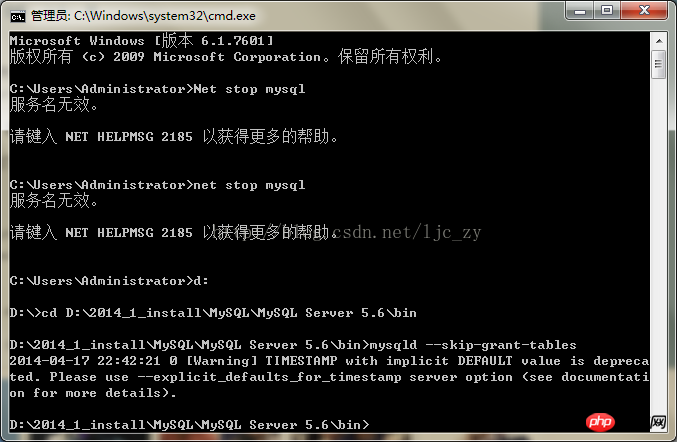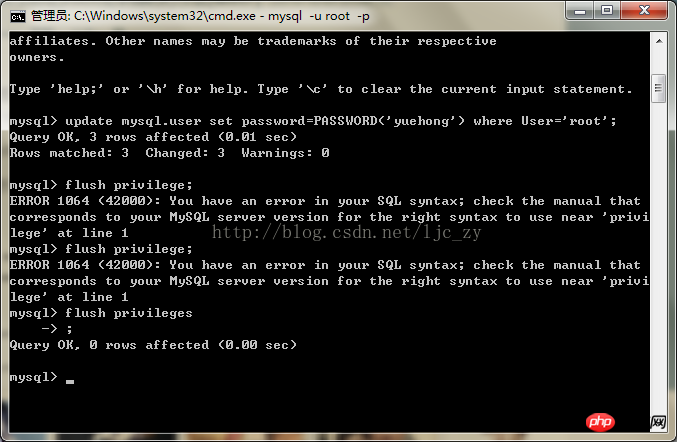 Database
Database
 Mysql Tutorial
Mysql Tutorial
 Detailed graphic and text introduction on how to reset the Mysql root password if you forget it under Windows
Detailed graphic and text introduction on how to reset the Mysql root password if you forget it under Windows
Detailed graphic and text introduction on how to reset the Mysql root password if you forget it under Windows
This article mainly introduces the reset method of Mysql forgetting the root password under Windows. It is very good and has reference value. Friends in need can refer to it
My machine environment:
Windows 2008 R2
MySQL 5.6
Using "Forgot Mysql root password under Window" Baidu, I found a lot of solutions. Most of them are similar with minor differences. The more classic one is [1] on Baidu Library, which is rich in pictures and text, and the organization is relatively clear. Follow the instructions described in this article immediately.
The specific operations are as follows:
If the MySQL environment variable is added in the following steps, you can directly run the mysql related commands. Otherwise, you must go to the bin directory of the mysql installation directory to operate.
The steps are as follows:
1. Stop the mysql service (run as administrator under the cmd command line) net stop mysql
2. Use the mysqld –skip-grant-tables command to start the mysql database
D:\>net stop mysql The MySQL service is stopping. The MySQL service has been stopped successfully.
D:\>mysqld --skip-grant-tables

3. Without closing the above window, open a new cmd window and enter mysql - u root, just press the Enter key
D:\>mysql -u root Welcome to the MySQL monitor. Commands end with ; or \g. Your MySQL connection id is 1 Server version: 5.1.26-rc-community MySQL Community Server (GPL) Type 'help;' or '\h' for help. Type '\c' to clear the buffer. mysql> update mysql.user set password=password('aaa') where user='root';
You can write the password by yourself.
Query OK, 1 row affected (0.02 sec) Rows matched: 2 Changed: 1 Warnings: 0 mysql> flush privileges; Query OK, 0 rows affected (0.00 sec) mysql>

4. Open the task manager, stop the mysql and mysqld processes, use net start mysql to start the mysqld service, and then you can use the root user root password to enter the database
mysql -u root -p aaa
Additional instructions:
1. Mysqld usage instructions can be obtained and viewed using the following command:
mysqld --verbose --help > d:\mysqld_help.txt
The help for –skip-grant-tables in the help is:
--skip-grant-tables Start without grant tables. This gives all users FULL ACCESS to all tables!
So we can use mysql -uroot directly without a password Log in to mysql and can modify any table.
In my practice, I use mysqld --skip-grant-tables to start mysql, mysql -u root -p and I can log in with an empty password. If I change the password, it will prompt success. However, when I start mysql normally, use new Password still cannot log in. I thought that since I couldn't find the answer on the Chinese website, I would try to find the answer on a foreign website. So I searched for mysql 5.6 forget root password as the keyword, and found the answer in a document "B.5.3.2 How to Reset the Root Password" [2] on mysql.com.
The specific steps are as follows:
(1) Stop mysql
If running as a service, stop the mysql service in the service management tool. Or run the following command on the console.
net stop mysql56
If it is not running as a service, terminate the mysqld process in the task manager.
(2) Create a text file and write the following content. MyNewPass is the new password
SET PASSWORD FOR 'root'@'localhost' = PASSWORD('MyNewPass');
(3) Save as c:\init.txt
(4) Execute the following command in the console window
mysqld --init-file=C:\\init.ini
Note:
1) If the MySQL environment variable is added, you can directly run the mysql related commands, otherwise you must go to the bin directory of the mysql installation directory to operate
2) If you installed Mysql using the Mysql installation wizard, you need to add the --defaults-file parameter. The command is as follows:
mysqld --defaults-file="C: \ProgramData\MySQL\MySQL Server 5.6\my.ini" --init-file=C:\\init.ini
--defaults-file parameter can be obtained from service management: Start>Control Panel>Administrative Tools>Services, find the MySql service, right-click, select the Properties tab, and the "Execution Path" contains the --defaults-file parameter.
(5) After the system starts successfully, close Mysql and delete the init.ini file.
The above is the detailed graphic and text introduction on how to reset the forgotten root password of Mysql under Windows. For more related content, please pay attention to the PHP Chinese website (www.php.cn)!

Hot AI Tools

Undresser.AI Undress
AI-powered app for creating realistic nude photos

AI Clothes Remover
Online AI tool for removing clothes from photos.

Undress AI Tool
Undress images for free

Clothoff.io
AI clothes remover

Video Face Swap
Swap faces in any video effortlessly with our completely free AI face swap tool!

Hot Article

Hot Tools

Notepad++7.3.1
Easy-to-use and free code editor

SublimeText3 Chinese version
Chinese version, very easy to use

Zend Studio 13.0.1
Powerful PHP integrated development environment

Dreamweaver CS6
Visual web development tools

SublimeText3 Mac version
God-level code editing software (SublimeText3)

Hot Topics
 1653
1653
 14
14
 1413
1413
 52
52
 1305
1305
 25
25
 1251
1251
 29
29
 1224
1224
 24
24
 MySQL's Role: Databases in Web Applications
Apr 17, 2025 am 12:23 AM
MySQL's Role: Databases in Web Applications
Apr 17, 2025 am 12:23 AM
The main role of MySQL in web applications is to store and manage data. 1.MySQL efficiently processes user information, product catalogs, transaction records and other data. 2. Through SQL query, developers can extract information from the database to generate dynamic content. 3.MySQL works based on the client-server model to ensure acceptable query speed.
 How to start mysql by docker
Apr 15, 2025 pm 12:09 PM
How to start mysql by docker
Apr 15, 2025 pm 12:09 PM
The process of starting MySQL in Docker consists of the following steps: Pull the MySQL image to create and start the container, set the root user password, and map the port verification connection Create the database and the user grants all permissions to the database
 Laravel Introduction Example
Apr 18, 2025 pm 12:45 PM
Laravel Introduction Example
Apr 18, 2025 pm 12:45 PM
Laravel is a PHP framework for easy building of web applications. It provides a range of powerful features including: Installation: Install the Laravel CLI globally with Composer and create applications in the project directory. Routing: Define the relationship between the URL and the handler in routes/web.php. View: Create a view in resources/views to render the application's interface. Database Integration: Provides out-of-the-box integration with databases such as MySQL and uses migration to create and modify tables. Model and Controller: The model represents the database entity and the controller processes HTTP requests.
 Solve database connection problem: a practical case of using minii/db library
Apr 18, 2025 am 07:09 AM
Solve database connection problem: a practical case of using minii/db library
Apr 18, 2025 am 07:09 AM
I encountered a tricky problem when developing a small application: the need to quickly integrate a lightweight database operation library. After trying multiple libraries, I found that they either have too much functionality or are not very compatible. Eventually, I found minii/db, a simplified version based on Yii2 that solved my problem perfectly.
 How to install mysql in centos7
Apr 14, 2025 pm 08:30 PM
How to install mysql in centos7
Apr 14, 2025 pm 08:30 PM
The key to installing MySQL elegantly is to add the official MySQL repository. The specific steps are as follows: Download the MySQL official GPG key to prevent phishing attacks. Add MySQL repository file: rpm -Uvh https://dev.mysql.com/get/mysql80-community-release-el7-3.noarch.rpm Update yum repository cache: yum update installation MySQL: yum install mysql-server startup MySQL service: systemctl start mysqld set up booting
 Laravel framework installation method
Apr 18, 2025 pm 12:54 PM
Laravel framework installation method
Apr 18, 2025 pm 12:54 PM
Article summary: This article provides detailed step-by-step instructions to guide readers on how to easily install the Laravel framework. Laravel is a powerful PHP framework that speeds up the development process of web applications. This tutorial covers the installation process from system requirements to configuring databases and setting up routing. By following these steps, readers can quickly and efficiently lay a solid foundation for their Laravel project.
 MySQL and phpMyAdmin: Core Features and Functions
Apr 22, 2025 am 12:12 AM
MySQL and phpMyAdmin: Core Features and Functions
Apr 22, 2025 am 12:12 AM
MySQL and phpMyAdmin are powerful database management tools. 1) MySQL is used to create databases and tables, and to execute DML and SQL queries. 2) phpMyAdmin provides an intuitive interface for database management, table structure management, data operations and user permission management.
 Centos install mysql
Apr 14, 2025 pm 08:09 PM
Centos install mysql
Apr 14, 2025 pm 08:09 PM
Installing MySQL on CentOS involves the following steps: Adding the appropriate MySQL yum source. Execute the yum install mysql-server command to install the MySQL server. Use the mysql_secure_installation command to make security settings, such as setting the root user password. Customize the MySQL configuration file as needed. Tune MySQL parameters and optimize databases for performance.



